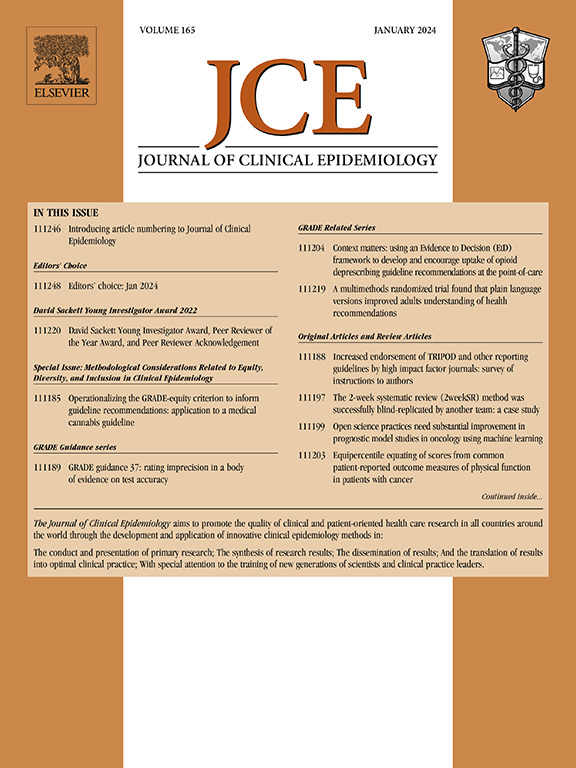二甲双胍治疗乳腺癌:无活性比较物的观察性研究中流行的新用户设计的应用。
IF 5.2
2区 医学
Q1 HEALTH CARE SCIENCES & SERVICES
引用次数: 0
摘要
目的:大量观察性研究报告了使用二甲双胍可显著降低包括女性乳腺癌在内的癌症结局。然而,大多数研究都受到不朽时间偏差的影响。我们评估了诊断为乳腺癌的女性使用二甲双胍是否与较低的乳腺癌相关死亡率和全因死亡率相关,并说明了不朽时间偏差对结果的影响。研究设计和背景:临床实践研究数据链(CPRD)用于确定1998年至2020年间所有新诊断为乳腺癌和2型糖尿病的女性的基础队列,年龄至少为18岁。我们采用流行的新用户设计,将二甲双胍启动者与非用户在既往糖尿病诊断和时间条件倾向评分上1:1匹配。我们还使用naïve方法,该方法在对二甲双胍用户进行分类时引入了不朽时间。估计全因死亡和乳腺癌相关死亡的风险比(HR)和95%置信区间(CI)。结果:基础队列包括13,314名新诊断为乳腺癌和2型糖尿病的女性,在乳腺癌诊断前(n=4,761)和后(n=8,553),其中5,047名在随访期间开始使用二甲双胍。普遍的新用户设计包括4,923名二甲双胍启动者和4,923名匹配的非用户。乳腺癌相关死亡率和全因死亡率的hr分别为1.12 (95% CI: 0.98-1.28)和0.96 (95% CI: 0.89-1.05)。naïve方法在队列入组的糖尿病女性中,包括1354名二甲双胍服用者和3407名非二甲双胍服用者,乳腺癌和全因死亡率的调整hr分别为0.45 (95% CI: 0.40-0.50)和0.58 (95% CI: 0.54-0.62)。结论:在这项研究中,二甲双胍的使用与乳腺癌相关和全因死亡率的降低风险无关。使用不考虑不朽时间偏差的有缺陷的方法,我们证实了先前研究中报道的二甲双胍对乳腺癌和全因死亡率的令人难以置信的有益作用。本文章由计算机程序翻译,如有差异,请以英文原文为准。

Metformin to treat breast cancer: an application of the prevalent new-user design for observational studies with no active comparator
Objectives
Numerous observational studies have reported significant reductions in cancer outcomes, including breast cancer in women, with metformin use. However, most studies were affected by immortal time bias. We assessed whether metformin use in women diagnosed with breast cancer is associated with lower breast cancer-related and all-cause mortality and illustrate the impact of immortal time bias on the results.
Study Design and Setting
The Clinical Practice Research Datalink was used to identify a base cohort of all women with a new diagnosis of breast cancer and with type 2 diabetes, at least 18 years of age, between 1998 and 2020. We employed the prevalent new-user design to match metformin initiators 1:1 with nonusers on a prior diabetes diagnosis and time-conditional propensity scores. We also used the naïve approach that introduces immortal time when classifying metformin users. Hazard ratios (HRs) and 95% CIs of all-cause and breast cancer-related death were estimated.
Results
The base cohort included 13,314 women newly diagnosed with breast cancer and with type 2 diabetes, before (n = 4761) and after (n = 8553) their breast cancer diagnosis, of which 5047 initiated metformin during follow-up. The prevalent new-user design included 4923 metformin initiators and 4923 matched nonusers. The HRs of breast cancer-related and all-cause mortality were 1.12 (95% CI: 0.98–1.28) and 0.96 (95% CI: 0.89–1.05), respectively. The naïve approach, among women with diabetes at cohort entry, which included 1354 metformin users and 3407 metformin nonusers, resulted in adjusted HRs of 0.45 (95% CI: 0.40–0.50) and 0.58 (95% CI: 0.54–0.62) for breast cancer and all-cause mortality.
Conclusion
In this study, the use of metformin was not associated with a reduced risk of breast cancer-related and all-cause mortality. Using the flawed approach not accounting for immortal time bias, we confirmed the implausible beneficial effects of metformin on breast cancer and all-cause mortality reported in previous studies.
Plain Language Summary
Observational studies have reported that the antidiabetic drug metformin can increase the survival of women with breast cancer. However, these studies were shown to have a flaw in their analysis, called “immoral time bias”, known to exaggerate the benefit of a drug. We used a cohort of over 13,000 women with breast cancer to investigate the effectiveness of metformin on reducing mortality in women with breast cancer, using both the flawed and a correct time-matched approach. Using the flawed approach, we confirmed the implausible beneficial effects of metformin on breast cancer-related and on all-cause mortality reported in previous studies. Using the correct time-matched approach, we found that the use of metformin was not associated with these beneficial effects, confirming the impact of the flaw.
求助全文
通过发布文献求助,成功后即可免费获取论文全文。
去求助
来源期刊

Journal of Clinical Epidemiology
医学-公共卫生、环境卫生与职业卫生
CiteScore
12.00
自引率
6.90%
发文量
320
审稿时长
44 days
期刊介绍:
The Journal of Clinical Epidemiology strives to enhance the quality of clinical and patient-oriented healthcare research by advancing and applying innovative methods in conducting, presenting, synthesizing, disseminating, and translating research results into optimal clinical practice. Special emphasis is placed on training new generations of scientists and clinical practice leaders.
 求助内容:
求助内容: 应助结果提醒方式:
应助结果提醒方式:


